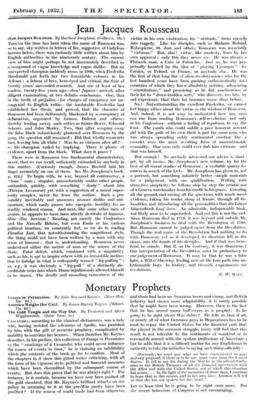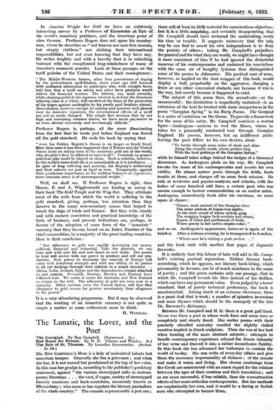Monetary Prophets
Essays in Persuasion. By John Maynard Keynes. (Macmillan. 10s. ed.)
America Weighs Her Gold. By Jaine-s Harvey Rogers. (Milford.
Its. lid.) The Gold Tangle and the Way Out. Sy Frederick and Alfred
Cassaxnna, according to the classical dictionaries, was a lady who, having resisted the advances of Apollo, was punished by him with the gift of accurate prophecy, complicated by inability to convince her hearers. _ When therefore Mr. Keynes describes, in his preface, this collection of Essays in Persuasion as the-" croakings of a- Cassandra Who could never -influence the course of events in time," he is claiming an infallibility which ,,,the contents of the book go far to confirm. Most of the chapters in it show this gifted writer criticizing, with all the force-of his vigorous style, political and financial measures which -hate been discredited by the subsequent eourse.. of events. But does this prove that he was always right ? or instance, is it certain, because we have now been pushed off the gold standard, that Mr. Keynes's brilliant attacks on Our policy in- returning to it at the pre-War parity have been justified ? If the course_ of world trade had been otherwise, and there had been no American boons and 'slump, and British industry had shown more adaptability, it is surely. possible that he might have been wrong. However, there is the fact that he has scored many bull's-eyes as a prophet. Is he going to be right about War debts ? l le tells us that if all, or nearly all of what Germany pays in Reparations has to be used to- repay the United States for the liniMCial part that she played in the common struggle, ninny will feel that this result is not tolerable to the sentiments of mankind or in reasonable accord with the spoken Professions of Americans ; but he adds that it is a difficult matter for any Englishman in authority to take the initiative in saying such things officially:
"Obviously, We must pay what we have eonvenanted to pay, and any proposal, if there is to be one, must come from tho.Unitesi States. It fell to may lot during the War to he the official drafts- man in the British Treasury el all the finaneial agreements with the Allies and with the United States, out of whiell this situation has arisen. . . In the light of the memories of those days; I continuo to hope that in due course, and in her own time, America will tell us that she has not spoken her test word."
Let us hope that be is going to be right onee.pore. But the recent behaviour of Congress is not encouraging,
In America Weighs her Gold ;we have an extremely _ interesting survey by a Professor -of Economics at Yale of the world's monetary problems, and the American point of view thereon. Professor Rogers does not spare his country- men, whom he describes as 'not knaves nor care-free morons, but simply children," not shirking their international responsibilities, but not even knowing that they• have any.
Ile writes brightly and with a brevity that is in refreshing contrast with the complicated long-windedness of many of America's economic pundits. Look at these passages on the tariff policies of the United States and their consequences: "The Middle-Western farmer, after four generations of duping by the protectionist spell-binders, throe years ago atilt listened with unabated admiration to politicians who, with straight facea, told him that a tariff on wheat and other farm products would relieve his financial worries. The laborer, too, until recently, while claiming publicly his supreme interest in at least the American laboring class as a whole, still swallowed the hoax of the protection af his wages against onslaughts by his poorly paid brothers abroad. Nevertheless, however corrupt its making and however well glossed Over its domestic injustices, the international effects of a tariff are not so easily changed. The simple fact remains that by our high and increasing customs duties, we have made payments to us from abroad extremely and increasingly difficult."
Professor Rogers is, perhaps, all the more illuthinating from the fact that he wrote just before England was forced off the gold standard. He ends his book by saying That
"even his Golden Majesty's throne is no longer so firmly fixed. afore than once it has been suggested that if France and the 42inited States insist on taking most of the monetary gold out of the world, why shouldn't they be allowed to have it alit Certainly no greater practical joke could be played on them. Such a solution, however, to the world's immediate ills is as unrealizable as it is intelligent.. . Zn spite of long suffering and poverty, his Majesty's aristocracy and their cohorts are just as loyal as ever. Temporarily, against their ponderous importance, in the ruthless balances of experience, mere common sense is of inconsequential weight."
Well, we shall see. If Professor Rogers is right, then Messrs. P. and A. Wigglesworth are leading us astray in their book TheGold Tangle and the Way Out. They attribute most of the evils from which the world is suffering to the gold standard, giving, perhaps, less attention than they deserve to the many non-monetary causes that helped to Wreck the ships of trade and finance: But they write clearly and with earnest conviction and practical knowledge of the Theta of business, and present indications are, perhaps, ill favour of the adoption of some form of the " isometric " tummy that they favour, based on an Index Number of the 'chief commodities, by a majority of the great trading countries. Here is their conclusion :
"Our adherence to gold was rapidly destroying our power,
fulencial and industrial. Like the phoenix, we can arise now with new life and new heart to new tasks. Our power to lend will revive with our power to produce and sell our pro- duction. New power to dominate the councils of Eprope will corns with industrial strength and with our ability to do justice in all one dealings 'through their relation- ter a sound standard. . . Africa, India, Ireland, Egypt and the dependencies remain attached to our eysteax. Denmark, Norway, Sweden and Finland have followed suit. We make it easier for Australia and New Zealand to return to the fold. The adherents of gold are even now in a minority. Other nations, even the United States, will find that allegiance to gold means far greater uncertainty than allegiance to the pound."
'His a very stimulating programme. But it may be observed that the working of an isometric currency is not quite so simple a matter as some enthusiasts seem to think.









































 Previous page
Previous page